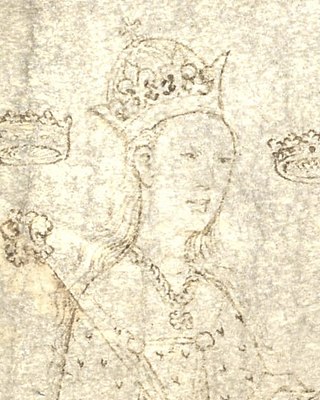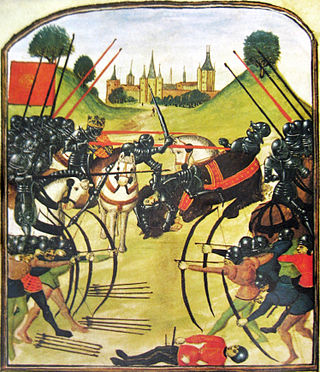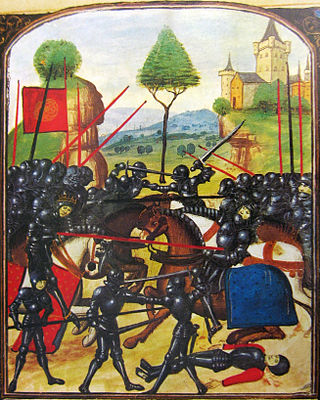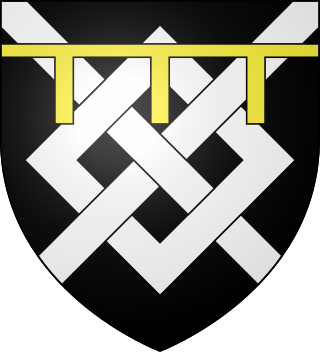Related Research Articles

Edward IV was King of England from 4 March 1461 to 3 October 1470, then again from 11 April 1471 until his death in 1483. He was a central figure in the Wars of the Roses, a series of civil wars in England fought between the Yorkist and Lancastrian factions between 1455 and 1487.

Henry VI was King of England from 1422 to 1461 and again from 1470 to 1471, and disputed King of France from 1422 to 1453. The only child of Henry V, he succeeded to the English throne upon his father's death, at the age of eight months; and succeeded to the French throne on the death of his maternal grandfather, Charles VI, shortly afterwards.

Elizabeth Woodville, later known as Dame Elizabeth Grey, was Queen of England from 1 May 1464 until 3 October 1470 and from 11 April 1471 until 9 April 1483 as the wife of King Edward IV. She was a key figure in the Wars of the Roses, a dynastic civil war between the Lancastrian and the Yorkist factions between 1455 and 1487.

George Plantagenet, Duke of Clarence, was the sixth child and third surviving son of Richard Plantagenet, 3rd Duke of York, and Cecily Neville, and the brother of English kings Edward IV and Richard III. He played an important role in the dynastic struggle between rival factions of the Plantagenets now known as the Wars of the Roses.

Richard Neville, 16th Earl of Warwick, 6th Earl of Salisbury, known as Warwick the Kingmaker, was an English nobleman, administrator, landowner of the House of Neville fortune and military commander. The eldest son of Richard Neville, 5th Earl of Salisbury, he became Earl of Warwick through marriage, and was the wealthiest and most powerful English peer of his age, with political connections that went beyond the country's borders. One of the leaders in the Wars of the Roses, originally on the Yorkist side but later switching to the Lancastrian side, he was instrumental in the deposition of two kings, which led to his epithet of "Kingmaker".

Anne Neville was Queen of England from 26 June 1483 until her death in 1485 as the wife of King Richard III. She was the younger of the two daughters and co-heiresses of Richard Neville, 16th Earl of Warwick, and Anne de Beauchamp. Before her marriage to Richard, she had been Princess of Wales as the wife of Edward of Westminster, Prince of Wales, the only son and heir apparent of King Henry VI.

The Battle of Tewkesbury, which took place on Saturday 4 May 1471, was one of the most decisive battles of the Wars of the Roses in England.

The Battle of Barnet was a decisive engagement in the Wars of the Roses, a dynastic conflict of 15th-century England. The military action, along with the subsequent Battle of Tewkesbury, secured the throne for Edward IV.

The Battle of Towton took place on 29 March 1461 during the Wars of the Roses, near Towton in North Yorkshire, and "has the dubious distinction of being probably the largest and bloodiest battle on English soil". Fought for ten hours between an estimated 50,000 soldiers in a snowstorm on Palm Sunday, the Yorkist army achieved a decisive victory over their Lancastrian opponents. As a result, Edward IV deposed the Lancastrian Henry VI and secured the English throne.

Edward of Westminster, also known as Edward of Lancaster, was the only child of Henry VI of England and Margaret of Anjou. He was killed aged seventeen at the Battle of Tewkesbury.

Edmund Beaufort, styled 4th Duke of Somerset, 6th Earl of Somerset, 3rd Marquess of Dorset, 3rd Earl of Dorset, was an English nobleman, and a military commander during the Wars of the Roses, in which he supported the Lancastrian king Henry VI.
John Neville, 1st Marquess of Montagu was a major magnate of fifteenth-century England. He was a younger son of Richard Neville, 5th Earl of Salisbury, and the younger brother of Richard Neville, Earl of Warwick, the "Kingmaker".

George Neville was Archbishop of York from 1465 until 1476 and Chancellor of England from 1460 until 1467 and again from 1470 until 1471.
Thomas Fauconberg or Thomas Neville, sometimes called Thomas the Bastard, or the Bastard of Fauconberg, was the natural son of William Neville, Lord Fauconberg, who was a leading commander in the Hundred Years' War and, until joining his cousin, Richard Neville in rebellion on the Lancastrian side against another cousin, Edward IV, served on the Yorkist side in the Wars of the Roses.

Sir John Courtenay was the third son of Thomas Courtenay, 13th Earl of Devon, and Margaret Beaufort, and was styled Earl of Devon by Lancastrians in exile, following the execution of his brother the 14th earl in 1461.
Events from the 1470s in England.

The Readeption was the restoration of Henry VI of England to the throne of England in 1470. Edward, Duke of York, had taken the throne as Edward IV in 1461. Henry had fled with some Lancastrian supporters and spent much of the next few years in hiding in Northern England or in Scotland, where there was still some Lancastrian support. Henry was captured in 1465 and was held as a prisoner in the Tower of London. Following dissent with his former key supporter, Richard Neville, 16th Earl of Warwick, Edward was forced to flee in 1470. Henry was then restored to the throne, although he was deposed again the following year.

The Wars of the Roses, known at the time and in following centuries as the Civil Wars, were a series of civil wars fought over control of the English throne from 1455 to 1487. The wars were fought between supporters of the House of Lancaster and House of York, two rival cadet branches of the royal House of Plantagenet. The conflict resulted in the end of Lancaster's male line in 1471, leaving the Tudor family to inherit their claim to the throne through the female line. Conflict was largely brought to an end upon the union of the two houses through marriage, creating the Tudor dynasty that would subsequently rule England.

Sir James Harrington of Hornby was an English politician and soldier who was a prominent Yorkist supporter in Northern England during the Wars of the Roses, having been retained by Richard Neville, 5th Earl of Salisbury, who was brother-in-law to the head of the House of York, Richard of York. He was the second son of Sir Thomas Harrington, who had died with the king's father at the Battle of Wakefield in December 1460. James himself had fought with Salisbury at the Battle of Blore Heath in 1459, where he had been captured and imprisoned by the Lancastrians until the next year. He was a significant regional figure during the reign of King Edward IV, although the early years of the new king's reign were marred by a bitter feud between him and the Stanley family over a castle in Lancashire. On the accession of King Richard III in 1483, he was appointed to the new king's Household, and as such was almost certainly with him at the Battle of Bosworth Field two years later. It is likely that he fell in battle there, although precise details of his death are now unknown.

The siege of London was an episode of the Wars of the Roses between 12 and 15 May 1471, in which adherents of the House of Lancaster commanded by Thomas Neville unsuccessfully attempted to storm the city and free King Henry VI, who had been imprisoned in the Tower of London by his rival Edward IV of the House of York. This confrontation, which was an epilogue to the recent battles of Barnet and Tewkesbury, completed the final restoration of Edward IV and ensured the Yorkist hold on the throne.
References
- ↑ Ross, Charles (1997). Edward IV (new ed.). New Haven, London: Yale University Press. p. 153. ISBN 0-300-07372-0.
- ↑ Hicks, Michael (1998). Warwick the Kingmaker. Oxford: Blackwell. p. 307. ISBN 0-631-16259-3.
- ↑ Ross (1997), pp. 167–8.
- 1 2 3 Bruce, John (8 May 1838). "Historie of the Arrivall of Edward IV, in England and the Finall Recouerye of His Kingdomes from Henry VI. A.D. M.CCCC.LXXI". Richard III Society. Archived from the original on 14 October 2009. Retrieved 2 October 2008.